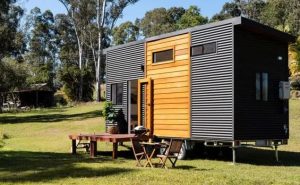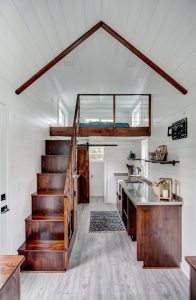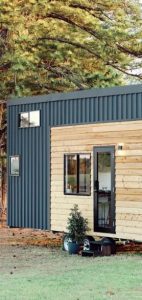Tiny House Guide
|
Tiny Houses have become popular alternate way to provide affordable accommodation. They also have a much smaller carbon footprint, allow a sustainable and a more minimalist lifestyle. With many styles and types available, owners need to consider both local and state planning legislation when considering this form of living. Outlined below is some general information to help guide you through the various requirements and approvals that apply. |
 |
| Definitions |
|
| campervan | means a moveable dwelling, other than a caravan, designed to be capable of being registered as a motor vehicle, and includes a camper trailer. |
| caravan | means a moveable dwelling designed to be capable of being registered as a trailer, but does not include a camper trailer. |
| manufactured home |
means a self-contained dwelling (that is, a dwelling that includes at least one kitchen, bathroom, bedroom and living area and that also includes toilet and laundry facilities), being a dwelling— (a) that comprises one or more major sections, and (b) that is not a motor vehicle, trailer or other registrable vehicle within the meaning of the Road Transport Act 2013, and includes any associated structures that form part of the dwelling. |
| moveable dwelling |
means- (a) any tent, or any caravan or other van or other portable device (whether on wheels or not), used for human habitation, or (b) a manufactured home, or (c) any conveyance, structure or thing of a class or description prescribed by the regulations for the purposes of this definition. |
| relocatable home |
means a manufactured home or other moveable dwelling, other than a tent, caravan, campervan or vehicle capable of being registered (a) whether or not self-contained, and (b) that consists of at least 1 major section, including anassociated structure forming part of the dwelling. |
| self-contained moveable dwelling | means a moveable dwelling that contains shower and toilet facilities. |
What is a tiny house?
 |
A tiny house is:
You will need to consider local and State planning legislation if you choose to live in this type of dwelling (house). The approval requirements depend on the type of tiny house you consider and the of the land it’s situated. |
 |
What Legislation applies? Tiny house installation and use is subject to the approval and design requirements of the NSW Government and Council’s planning controls. Council’s planning documents that apply are:
You will also need to consider NSW Government legislation:
|
What exemptions exist?
 |
You do not need development approval to keep your tiny house in your backyard or on your property, if you can register it with RMS as a trailer, and you meet certain exemptions. You do not need to get approval for your THOW in certain situations – Local Government (Manufactured Home Estates, Caravan Parks, Camping Grounds and Moveable Dwellings) Regulation 2021.
If not exempt as outlined, a THOW would need development approval and meet the relevant development controls and address any applicable constraints such bushfire, flooding, land use conflicts and the like. Note: The information in this clause changes often and Council recommends that you review it to keep updated on current standards. |
 |
What else do you need to consider? You will need to consider if approval is needed and what type for the following:
|
Your Questions Answered
|
Tiny house permanent (THP) |
Tiny house on wheels (THOW) |
|
Do I need development approval for my tiny house? |
|
|
Yes
Council requires a Development Application (or Complying Development Certificate, which can potentially be approved by a Private Certifier) to assess and determine proposals for a permanently constructed/installed tiny house. |
No
If the THOW is capable of being registered with the Roads and Maritime Services as a trailer, no development approval is required to put it in your backyard or on your property (subject to meeting a number of certain exemptions). |
|
Do I have to pay a development contribution? |
|
|
Yes
As a second dwelling, contributions are payable for connection to town water and sewerage services. Check with Council for further information |
No
|
|
Can I live in my tiny house, as a primary dwelling, on my vacant property? |
|
|
Potentially
Planning controls have been prepared for standard forms of housing, many of the zoning, site, and design requirements are still relevant to most forms of compact and tiny houses.
To be considered a primary dwelling, you will need to obtain development consent and show compliance with Building Code of Australia and have minimum amenities provided. Talk to us if this is your intention. |
Potentially
Current legislation does not allow for a tiny house as a primary dwelling as outlined in this fact sheet.
For a tiny house to be considered a primary dwelling, you will need to obtain development consent and show compliance with Building Code of Australia and Local Government Regulation building standard requirements. It’s best to consult with us if this is your intention. |
|
Can I, or a member of my household, live in my tiny house on my property, which has an approved, existing dwelling? |
|
|
Yes
|
Yes
You can have only 1 THOW if you or a member of your household will live in it, only when you have an approved existing dwelling already on the lot. You must maintain your tiny house in a safe and healthy condition for human habitation. |
|
Can I have more than one tiny house on my property? |
|
|
Potentially
You can’t have more than one fixed tiny house on your property under secondary dwelling land-use provisions. There may be opportunity to erect additional tiny houses under multi-dwelling provisions. Contact Council for specific advice relative to your property. |
Potentially
NSW Legislation permits some exemptions. See exemptions section.
Contact Council for specific advice relative to your property. |
|
Can I holiday let or rent out my tiny house? |
|
|
Potentially
The secondary dwelling can be rented out as a form of affordable rental housing.
Holiday letting requires development consent from Council. |
Potentially
The installation is for occupation by the owner or by members of the owner’s household only.
If you want to provide some tourist accommodation on farms larger than 15 hectares, you can have up to 6 caravans/THOWs (see exemptions section for more information).
Other holiday letting requires development consent from Council. |
|
Can I connect my tiny house to town sewer? |
|
|
Yes
You will require approval from Council to connect to the town sewerage system.
If a town sewer connection is not available, you will require approval from Council for an on-site sewerage management system. |
Yes
You will require approval from Council to connect to the town water supply and sewerage system.
If a town sewer connection is not available, you will require approval from Council for an on-site sewerage management system. |
|
How can I provide electricity to my tiny house? |
|
|
Connect to your property power supply or separate connection to the electricity network.
It is important to note that any electrical installation needs certification from a Licensed Electrical Contractor. |
If your THOW is close to a main dwelling, you can power it by running an RCD protected, caravan-rated, extension cord from the dwelling.
The use of solar power may suit you better. This can be portable such as a solar trailer or fixed to the structure.
It is important to note that any electrical installation needs certification from a Licensed Electrical Contractor. |
|
Can I connect my tiny house to town water? |
|
|
Yes
You will require approval from Council to connect to the existing dwelling connection to the town water supply.
Contributions may apply particularly if a second water meter is required. |
Yes
You will require approval from Council to connect to the existing dwelling connection to the town water supply.
An approval for a temporary connection from your main dwelling water supply is not required.
On other lots your will need a water collection and storage system. |
Contact Us
For Further Information please contact Council’s Planning Directorate:
Email: mail@hilltops.nsw.gov.au
Ph: 1300 44 55 86
Mail: Hilltops Council
Locked Bag 5
YOUNG NSW 2594
Disclaimer: While every reasonable effort has been made to ensure that this document is correct at the time of publication, Council, and its employees, disclaim any and all liability to any person in respect of anything or the consequences of anything done or omitted to be done in reliance upon the whole or any part of this document.
